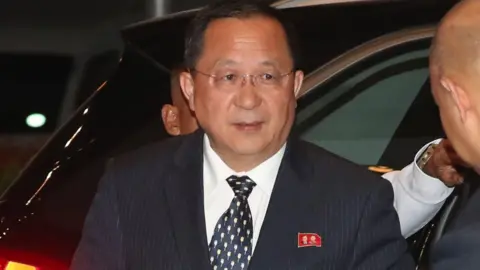North Korea: UN backs fresh sanctions over missile tests
The United Nations Security Council has agreed on fresh sanctions against North Korea over its missile programme.
A resolution banning North Korean exports and limiting investments in the country was passed unanimously.
The US ambassador to the UN, Nikki Haley, said it was "the most stringent set of sanctions on any country in a generation".
Pyongyang tested two intercontinental ballistic missiles in July, claiming it now had the ability to hit the US.
However, experts doubt the capability of the missiles to hit their targets.
The tests were condemned by South Korea, Japan and the US, and prompted the drafting of the new UN sanctions.
US Secretary of State Rex Tillerson is attending a regional forum of the Association of Southeast Asian Nations (Asean) in Manila, in the Philippines, with North Korean Foreign Minister Ri Yong-ho also present.
North Korea's nuclear programme is expected to be a major issue but there are no plans for a bilateral meeting, US officials say.
Speaking as he sat down for talks with South Korean Foreign Minister Kang Kyung-wha, Mr Tillerson said the sanctions were a "good outcome".
'Costly for the regime'
US President Donald Trump tweeted to say the sanctions would cost the North more than $1bn (£0.7bn).
The export of coal, ore and other raw materials to China is one of North Korea's few sources of cash. Estimates say that North Korea exports about $3bn worth of goods each year - and the sanctions could eliminate $1bn of that trade.
Earlier this year, China suspended imports of coal to increase pressure on Pyongyang.
However, repeated sanctions have so far failed to deter North Korea from continuing with its missile development.
The US ambassador said the Security Council had increased the penalty for North Korea's ballistic missile activity "to a whole new level".
"Today the Security Council has come together to put the North Korean dictator on notice," Ms Haley told the council after the vote on Saturday.
"North Korea's irresponsible and careless acts have just proved to be costly for the regime."
UK ambassador Matthew Rycroft said: "North Korea bears full responsibility for the measures we have enacted today.
"It does not have to be this way. North Korea should forgo the path of provocation, forgo the path of further escalation."
Meanwhile, North Korea's ruling-party newspaper Rodong Sinmun said nuclear action or sanctions taken by Washington would lead to an "unimaginable sea of fire" engulfing the US.
The article, printed before the new UN sanctions were approved, added that if the US did not move away from its "hostile policy towards Pyongyang, the only choice for the US is self-destruction".
'Sanctions are not the goal'
China, North Korea's only international ally and a veto-wielding member of the UN Security Council, voted in favour of the resolution this time. It has often protected Pyongyang from harmful resolutions in the past.
In Manila, Foreign Minister Wang Yi said the sanctions were "necessary" but were "not the ultimate purpose".
 EPA
EPA"Our purpose is to bring all parties involved in the nuclear issues back to negotiation table, finding the resolutions through talks to realise the denuclearization of Korean peninsula," he told journalists.
The isolated state's repeated missile and nuclear weapon tests have been condemned by neighbours in the region.
But South Korea says it may hold direct talks with the North during the Asean summit.
Its foreign minister said she was willing to talk to her counterpart from Pyongyang, if the chance "naturally occurs".
"I would like to deliver our desire for the North to stop its provocations and positively respond to our recent special offers [for talks] aimed at establishing a peace regime," she told South Korea's Yonhap news agency.
Altogether, 27 nations are sending representatives to the Asean forum.
Asean's 10 member states issued a joint statement saying they had "grave concerns" over North Korea's actions, which "seriously threaten peace".
